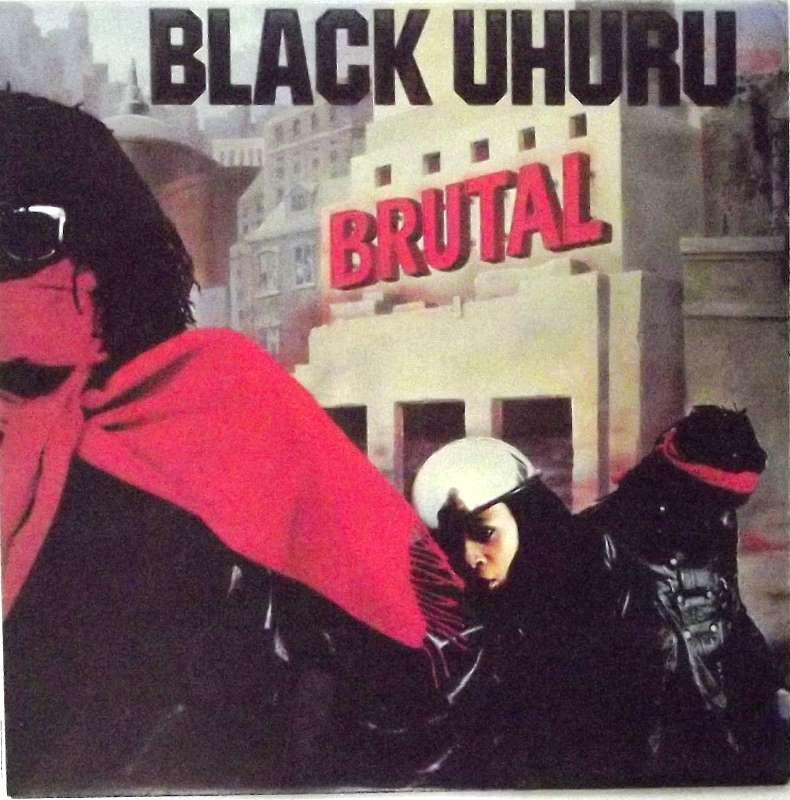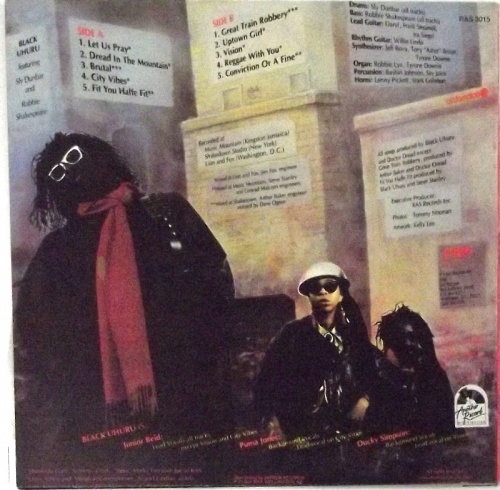

| Product Code: | RAS 3015 |
| Artist: | Black Uhuru |
| Origin: | New Zealand |
| Label: | Real Authentic Sound (1986) |
| Format: | LP |
| Availability: | Enquire Now |
| Condition: |
Cover: VG+
Record: NM (M-)
|
| Genre: | Reggae U |
Very smart clean Reggae vinyl with a nice clean cover.
Brutal," Black Uhuru sing on the album's title track, "the whole world is brutal." And so it must have seemed to Duckie Simpson and Puma Jones in 1985. The previous year, the group had won a Grammy for their album Anthem, but they'd crashed from such dizzying heights in a matter of months. The pair were left in the lurch when founding member and main song writer Michael Rose quit to pursue his solo career, and their relationship with Island Records came to an equally unsatisfactory conclusion. Regrouping, the duo brought in Junior Reid, a bit of synchronicity, as the singer had often worked in the past with Don Carlos, himself a founding member of Uhuru. More telling, however, was Reid's last project, Worry Struggle & Problem, a trio that also included Sugar Minott. Reid would bring an unexpected dancehall feel to the roots masters. Signing to RAS, and with Sly & Robbie and a party's worth of other musicians in tow, the trio set to work on the Doctor Dread-produced Brutal. Sadly, it's the production that lets down, and although Dread did his best to recapture the Taxi sound so integral to the group's previous albums, the best he can create is a kind of Taxi-lite. Producer Arthur Baker, in contrast, brought his own trademark sound to "Great Train Robbery," a masterpiece of beats, screaming guitar solos, and electronic wizardry wrapped around a stunning new wave arrangement. Of course, it was a club hit, although the trio were almost incidental to the song itself. Urban fans were satiated by the title track, while "Let Us Pray" and "Fit You Haffe Fit" were aimed straight at the heart of the dancehall crowds. An older Jamaican audience apparently was catered for by "Vision" and "Reggae With You." This pair drew the trio deep into the island's past, the '60s in the former's case and early reggae in the latter's. "Reggae," with its upbeat lyrics and just happy to dance attitude, seems particularly surreal coming from a formerly classic dread band. Only Ducky Simpson's "Conviction or a Fine" returns the group to their previous rootsy stylings. Brutal may have garnered Uhuru another Grammy nomination, but it boded badly for the future. Their last few albums had been almost as eclectic, but they had been built around unique hybridizations, not a pastiche of styles. Here, only "Dread in the Mountain" is a successful blend of genres, elsewhere the trio's trademark roots are overwhelmed. And the less said about Jones' foray into disco territory the better. But for all its flaws, there's still moments of greatness within.
Black Uhuru are a Jamaican reggae group formed in 1972, initially as Uhuru (Swahili for 'freedom'). The group has undergone several line-up changes over the years, with Derrick "Duckie" Simpson as the mainstay. They had their most successful period in the 1980s, with their album Anthem winning the first ever Grammy Award for Best Reggae Album in 1985.
The group formed in the Waterhouse district of Kingston in 1972, initially called simply "Uhuru" (the Swahili word for freedom), with a line-up of Garth Dennis, Don Carlos, and Derrick "Duckie" Simpson.[2] Their first release was a cover version of Curtis Mayfield's "Romancing to the Folk Song", which was followed by "Time is on Our Side"; Neither song was a success and they split up, with Carlos pursuing a solo career, as did Dennis, before joining The Wailing Souls.[2] Simpson also briefly worked with the Wailing Souls, before forming a new version of Uhuru with Errol Nelson (of The Jayes) and Michael Rose, the group now taking the name Black Sounds Uhuru.[3] Their Prince Jammy-produced debut album, Love Crisis, was released in 1977.